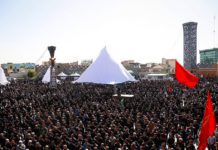Praise be to Allâh, we praise Him and seek His help and forgiveness. We seek refuge with Allâh from the evil of our own selves and from our evil deeds. Whomsoever Allâh guides cannot be misled, and whomsoever He leaves astray cannot be guided. I bear witness that there is no god except Allâh alone, with no partner or associate, and I bear witness that Muhammad is His slave and Messenger.
Allâh has blessed His slaves with certain seasons of goodness, in which hasanât (rewards for good deeds) are multiplied, sayiât (bad deeds) are forgiven, peoples status is raised, the hearts of the believers turn to their Master, those who purify themselves attain success and those who corrupt themselves fail. Allâh has created His slaves to worship Him, as He says (interpretation of the meaning):
| And I (Allâh) created not the jinns and humans except that they should worship Me (Alone). [al-Dhâriyât 51:56] |
One of the greatest acts of worship is fasting, which Allâh has made obligatory on His slaves, as He says (interpretation of the meaning):
| Observing al-sawm (the fasting) is prescribed for you as it was prescribed for those before you, that you may become al-muttaqûn (the pious). [al-Baqarah 2:183] |
Allâh encourages His slaves to fast:
| And that you fast, it is better for you, if only you know. [al-Baqarah 2:184 interpretation of the meaning] |
He guides them to give thanks to Him for having made fasting obligatory on them:
| that you should magnify Allâh for having guided you so that you may be grateful to Him. [al-Baqarah 2:185 interpretation of the meaning] |
He has made fasting dear to them, and has made it easy so that people do not find it too hard to give up their habits and what they are used to. Allâh says (interpretation of the meaning):
| for a fixed number of days [al-Baqarah 2:184] |
He has mercy on them and keeps them away from difficulties and harm, as He says (interpretation of the meaning:
| but if any of you is ill or on a journey, the same number (should be made up) from other days [al-Baqarah 2:184] |
No wonder then, that in this month the hearts of the believers turn to their Most Merciful Lord, fearing their Lord above them, and hoping to attain His reward and the great victory (Paradise).
As the status of this act of worship is so high, it is essential to learn the ahkâm (rulings) that have to do with the month of fasting so that the Muslim will know what is obligatory, in order to do it, what is harâm, in order to avoid it, and what is permissible, so that he need not subject himself to hardship by depriving himself of it.
This book is a summary of the rulings, etiquette and Sunnah of fasting. May Allâh make it of benefit to myself and my Muslim brothers. Praise be to Allâh, Lord of the Worlds.
Definition of Siyâm (fasting)
(1) Siyâm in Arabic means abstaining; in Islam it means abstaining from things that break the fast, from dawn until sunset, having first made the intention (niyyah) to fast.
Ruling on fasting
(2) The ummah is agreed that fasting the month of Ramadân is obligatory, the evidence for which is in the Qurân and Sunnah. Allâh says (interpretation of the meaning):
| O you who believe! Observing al-sawn (the fasting) is prescribed for you as it was prescribed for those before you, that you may become al-muttaqûn (the pious). [al-Baqarah 2:183] |
The Prophet (peace and blessings of Allâh be upon him) said: Islam is built on five [pillars] among which he mentioned fasting in Ramadân. (Reported by al-Bukhâri, al-Fath, 1/49). Whoever breaks the fast during Ramadân without a legitimate excuse has committed a serious major sin, The Prophet (peace and blessings of Allâh be upon him) said, describing a dream that he had seen:
| until I was at the mountain, where I heard loud voices. I asked, What are these voices? They said, This is the howling of the people of Hellfire. Then I was taken [to another place], and I saw people hanging from their hamstrings, with the corners of their mouths torn and dripping with blood. I said, Who are these? They said, The people who broke their fast before it was the proper time to do so, i.e., before the time of iftâr. (Sahîh al-Targhîb, 1/420). |
Al-Hâfiz al-Dhahabi (may Allâh have mercy on him) said,
| Among the believers it is well-established that whoever does not fast in Ramadân without a valid excuse is worse than an adulterer or drunkard; they doubt whether he is even a Muslim at all, and they regard him as a heretic and profligate. Shaykh al-Islam [Ibn Taymiyah] (may Allâh have mercy on him) said: If a person does not fast in Ramadân knowing that it is harâm but making it halâl for himself to do so, kill him; and if he does it because he is immoral [but believes it is harâm], then punish him for not fasting. (Majmû al-Fatâwa, 25/265). |
The virtues of fasting
(3) The virtues of fasting are great indeed, and one of the things reported in the sahîh ahâdîth is that Allâh has chosen fasting for Himself, and He will reward it and multiply the reward without measure, as He says [in the hadîth qudsi]: Except for fasting which is only for My sake, and I will reward him for it. (al-Bukhâri, al-Fath, no. 1904; Sahîh al-Targhîb, 1/407). Fasting has no equal (al-Nisâ’i, 4/165; Sahîh al-Targhîb, 1/413), and the duâ of the fasting person will not be refused (reported by al-Bayhaqi, 3/345; al-Silsilat al-Sahîh, 1797). The fasting person has two moments of joy: one when he breaks his fast and one when he meets his Lord and rejoices over his fasting (reported by Muslim, 2/807). Fasting will intercede for a person on the Day of Judgement, and will say, O Lord, I prevented him from his food and physical desires during the day, so let me intercede for him. (Reported by Ahmad, 2/174. Al-Haythami classed its isnâd as hasan in al-Majma, 3/181. See also Sahîh al-Targhîb, 1/411). The smell that comes from the mouth of a fasting person is better with Allâh than the scent of musk. (Muslim, 2/807). Fasting is a protection and a strong fortress that keeps a person safe from the Fire. (Reported by Ahmad, 2/402; Sahîh al-Targhîb, 1/411; Sahîh al-Jâmi, 3880). Whoever fasts one day for the sake of Allâh, Allâh will remove his face seventy years distance from the Fire. (Reported by Muslim, 2/808). Whoever fasts one day seeking the pleasure of Allâh, if that is the last day of his life, he will enter Paradise. (Reported by Ahmad, 5/391; Sahîh al-Targhîb, 1/412). In Paradise there is a gate called al-Rayyân, through those who fast will enter, and no one will enter it except them; when they have entered it will be locked, and no-one else will enter through it. (al-Bukhâri, Fath, no. 1797).
Ramadân is a pillar of Islam; the Qurân was revealed in this month, and in it there is a night that is better than a thousand months. When Ramadân begins, the gates of Paradise are opened and the gates of Hell are closed, and the devils are put in chains. (Reported by al-Bukhâri, al-Fath, no. 3277). Fasting Ramadân is equivalent to fasting ten months (See Musnad Ahmad, 5/280; Sahîh al-Targhîb, 1/421). Whoever fasts Ramadân out of faith and with the hope of reward, all his previous sins will be forgiven. (Reported by al-Bukhâri, Fath, no. 37). At the breaking of every fast, Allâh will choose people to free from Hellfire. (Reported by Ahmad, 5/256; Sahîh al-Targhîb, 1/419).
The benefits of fasting
(4) There is much wisdom and many benefits in fasting, which have to do with the taqwa mentioned by Allâh in the âyah (interpretation of the meaning):
| that you may become al-muttaqûn (the pious). [al-Baqarah 2:183] |
The interpretation of this is that if a person refrains from halâl things hoping to earn the pleasure of Allâh and out of fear of His punishment, it will be easier for him to refrain from doing harâm things.
If a persons stomach is hungry, this will keep many of his other faculties from feeling hunger or desires; but if his stomach is satisfied, his tongue, eye, hand and private parts will start to feel hungry. Fasting leads to the defeat of Shaytân; it controls desires and protects ones faculties.
When the fasting person feels the pangs of hunger, he experiences how the poor feel, so he has compassion towards them and gives them something to ward off their hunger. Hearing about them is not the same as sharing their suffering, just as a rider does not understand the hardship of walking unless he gets down and walks.
Fasting trains the will to avoid desires and keep away from sin; it helps a person to overcome his own nature and to wean himself away from his habits. It also trains a person to get used to being organized and punctual, which will solve the problem that many people have of being disorganized, if only they realized.
Fasting is also a demonstration of the unity of the Muslims, as the ummah fasts and breaks its fast at the same time.
Fasting also provides a great opportunity for those who are calling others to Allâh. In this month many people come to the mosque who are coming for the first time, or who have not been to the mosque for a long time, and their hearts are open, so we must make the most of this opportunity by preaching in a gentle manner, teaching appropriate lessons and speaking beneficial words, whilst co-operating in righteousness and good deeds. The daiyah should not be so preoccupied with others that he forgets his own soul and becomes like a wick that lights the way for others while it is itself consumed.






















